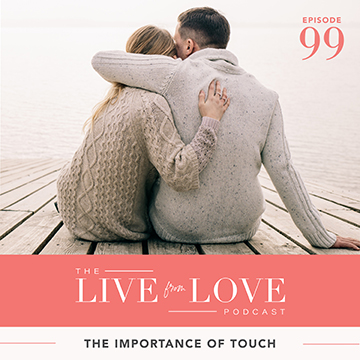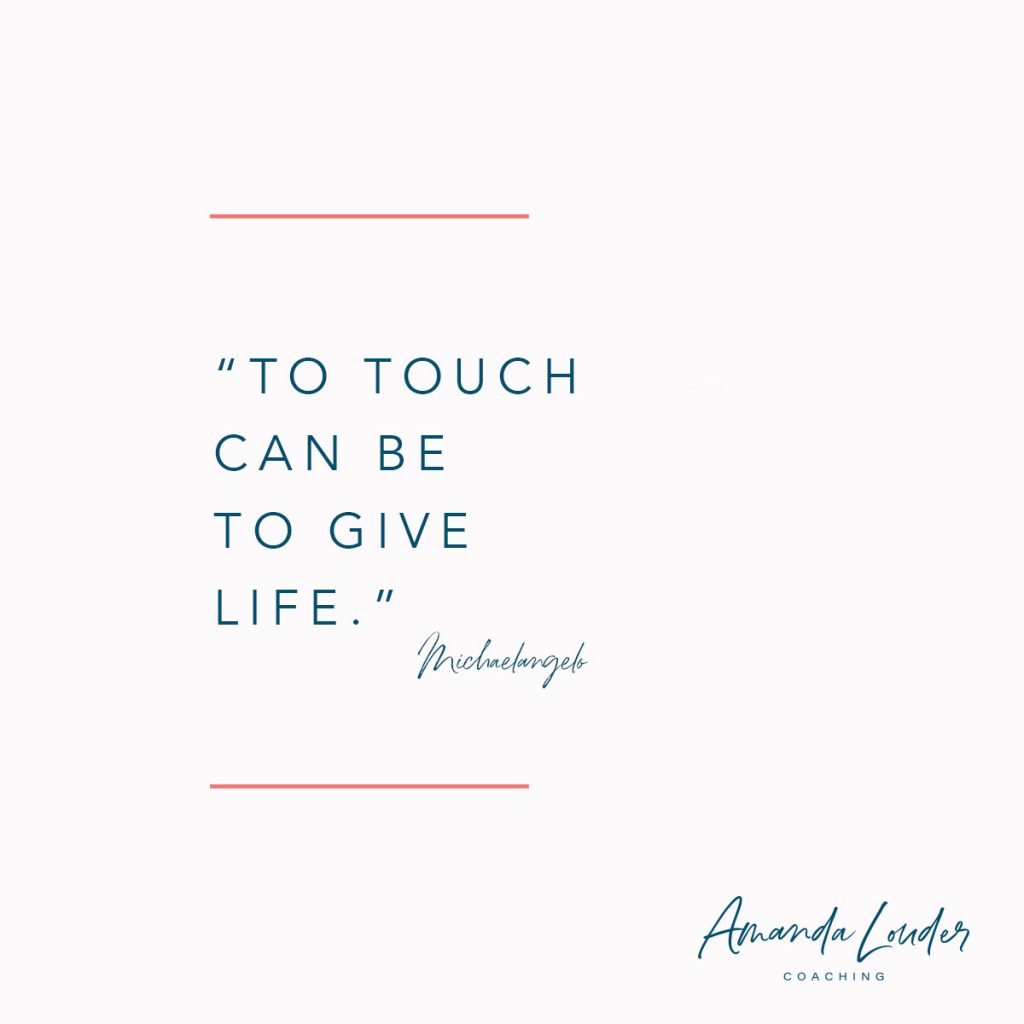
This week I researched the power of touch. There was plenty of information to back up my beliefs.
Being touched is the first communication a newborn babe has with those that love them. Skin to skin calms a crying baby, lowers adults’ heart rate and sends messages to the vagus nerve for relaxation. These are just a few of the numerous benefits.
I also talk about ideas and solutions for those times when you are simply “all touched out.” If you are a mother – especially to small children -you know exactly what I am talking about.
Sometimes learning to touch our spouse the way they want takes teaching and learning and communicating in love and compassion. Test it for yourself. You will be amazed at the difference it can make in your relationship.




Show Notes:
Follow Amanda on Facebook and Instagram.
Join Amanda’s Private Facebook Group.
References for this episode:
Show Summary:
A pat on the back. A caress of the arm. A hug. They may seem incidental, but these touches are more profound that we realize. In preparing for this episode, I did a lot of research on the importance of touch, and this is what I found.
The benefits of touch start from the moment we’re born. A review of research, conducted by Tiffany Field, a leader in the field of touch, found that preterm newborns who received just three 15-minute sessions of touch therapy each day for 5-10 days gained 47 percent more weight than premature infants who’d received standard medical treatment.
The benefits of skin-to-skin contact with a mother and newborn and numerous. It calms the mother and the baby. Helps baby cry less. It releases hormones to relieve stress and stabilize baby’s temperature, breathing rate, heart rate, and blood sugar.
“To touch can be to give life,” said Michelangelo
In adults, there are studies showing that touch signals safety and trust, it soothes. Basic warm touch calms cardiovascular stress. It activates the body’s vagus nerve, which is intimately involved with our compassionate response.
When we touch or are touched by someone we’re close to, we produce more of the mood boosting neurotransmitter serotonin and less of the stress hormone cortisol. Our heart rate and blood pressure go down, and our brain waves “change in the direction of relaxation.”
Touch is our primary language of compassion. It is fundamental to human communication, bonding, and health. And to stay connected romantically and emotionally, a couple needs to stay connected physically, by literally connecting. Not only can affectionate touch promote feelings of bonding and attachment in couples, according to multiple studies, but in long-term relationships, it can also contribute to overall physical health and well-being.
When we are first in a relationship, it’s pretty common to be quite physical with each other. You quite literally can’t keep your hands off of each other. But, over time, we often get distracted by the demands of work and home, and often we forget to touch our partners.
If you want to feel emotionally close to your partner, look for opportunities to be physically close to them—so close that you can easily make contact.
When we’re touched by a romantic partner, we experience a surge in the hormone oxytocin (aka “the love hormone”) in the brain, which helps to sustain feelings of deep attachment. Walking arm in arm, holding hands, put your foot gently on top of the other person’s under the table, sleeping in the other person’s arms are all great ways to do this. And why do we need to? The science of touch convincingly suggests that we’re wired to—we need to—connect with other people on a basic physical level. To deny that is to deprive ourselves of some of life’s greatest joys and deepest comforts.
As humans we are experts in differentiating between kinds of touch. We are better at it than reading people’s facial expressions or even in their vocal expression. When someone touches us, we understand what they are trying to communicate. And what I hear from many women is that they don’t like how they are being touched or they feel like they are touched out.
So, let’s talk about that.
As humans it is normal for us to touch each other in the ways that we want to be touched. So we aren’t necessarily good at touching our spouse in the way THEY want to be touched. So, we have to take the time to teach each other how we want to be touched, and not just expect our spouse to know.
And when I say teach them, I don’t mean yell at them for smacking your butt AGAIN! That isn’t teaching. Teaching is done in love. It’s done with tenderness and kindness. You need to be explicit in how you want to be touched. Take their hand and guide it with your own. Teach your partner what feels good and right for you if they don’t know how. And don’t expect to teach them once and have them “get it.” It may take repeated reminding and teaching. But clearly communicating to our partner when and how we like to be touched helps us get what we actually want, to be touched how and when we want.
But what if you are just “touched out?” This is a phrase I hear quite a bit, especially from young moms who are breastfeeding or have young kids that are climbing on them all day long. Being touched out is a real thing. And not only do you feel touched out, but then you also feel guilty for being irritated by those you love, right? This is all very normal, but there are ways to fix it.
As women, we are caretakers. We take care of our home, and our children, and sometimes our husbands. But it is very hard to go from mommy mode to sexy wife mode.
I was recently listening to a podcast with famed relationship and sexuality expert Ester Perel. In it she said “There is nothing that stands in the way more to a woman’s desire than a sense of caretaking. If I have to take care of everybody else I can’t think about me. If I can’t think about me, I cannot have any access to my sexual desire.”
She went on to say “The pathway to desire is to create a space between how I am completely absorbed by the needs of others and how I create the permission and the space to have my own needs. If that space doesn’t exist, then there won’t be sex, or if there is sex it’s because she’s taking care of her spouse. She takes care of the kids and then she has to take care of her spouse. It’s just more caretaking. The woman needs to have time to take care of herself and to be her self and not the caretaker. She needs to be made to take time for herself. Give yourself permission for a woman to exist. If the only role you can have is mother then there is no place for the sexuality to emerge. Sexuality doesn’t emerge in the space of mother, it exists in the space of woman.”
So the key to this, is that you have to create space for yourself to be out of mommy mode and into wife mode. You have to take time for yourself where you aren’t caretaking someone else. And it may seem counterintuitive, but a way to feel less touched out is to actually seek out more touch. But that touch needs to be focused on giving you energy and soothing your nerves, helping you recharge, rather than taking energy away. And sex is a great way to do that, but it has to be framed correctly.
Sex isn’t about taking care of him and his needs it’s about:
- Taking care of yourself and your needs
- Getting taken care of
Remember how being touched can produce more of the mood boosting neurotransmitter serotonin and less of the stress hormone cortisol. Its just about being touched in the right way.
Make sure you communicate this to your spouse. Rather than biting his head off when he makes advances, let him know you need some time for yourself to get out of mommy mode and into wife mode. Create that space for yourself. Take a bath. Read a book. Go for a walk. And then you can come back with a renewed sense of self and ready to engaged in a more erotic type of touch.



